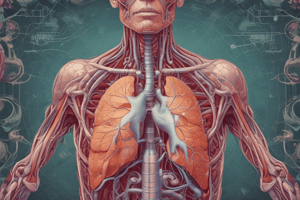Podcast
Questions and Answers
What is the difference between true hemoptysis and false hemoptysis?
What is the difference between true hemoptysis and false hemoptysis?
- True hemoptysis is alkaline, while false hemoptysis is acidic.
- True hemoptysis originates from above the vocal cords, while false hemoptysis originates from below.
- True hemoptysis is bright red & frothy, while false hemoptysis is dark red.
- True hemoptysis originates from below the vocal cords, while false hemoptysis originates from above. (correct)
Examination of the upper respiratory tract typically reveals the cause of false hemoptysis. (True/False)?
Examination of the upper respiratory tract typically reveals the cause of false hemoptysis. (True/False)?
False (B)
What should be ascertained in the history assessment for hemoptysis?
What should be ascertained in the history assessment for hemoptysis?
Previous hemoptysis episodes and cigarette smoking
The quantity of expectorated blood should be estimated because it influences the _____ of evaluation and treatment.
The quantity of expectorated blood should be estimated because it influences the _____ of evaluation and treatment.
Flashcards are hidden until you start studying
Study Notes
Hemoptysis
- Hemoptysis is the expectoration of blood, which can occur in the form of blood-streaked, blood-tinged, or frank hemoptysis.
- Two types of hemoptysis:
- True hemoptysis: Bleeding originating from below the vocal cords.
- False or spurious hemoptysis: Bleeding originating from above the vocal cords.
Etiology
- Larynx disorders:
- Laryngitis
- Foreign body
- Tumors
- Ulcers
- Tracho-Bronchial disorders:
- Acute infections
- Chronic bronchitis
- Violent coughing
- Inhaled foreign body
- Bronchiectasis
- Bronchogenic carcinoma
- Pulmonary disorders:
- Infections (Pulmonary TB, Massive pulmonary embolism, Lung abscess, Trauma, Pneumonia)
- Pulmonary haemosiderosis
- Aspergilloma
- Pulmonary A-V malformation
- Diffuse alveolar hemorrhage (caused by Vasculitis, Systemic lupus erythematosus, Anti-glomerular basement membrane disease)
- Cardiovascular disorders:
- Acute left heart failure
- Pulmonary oedema
- Mitral stenosis
- Severe hypertension
- Hematologic disease, anticoagulants, endometriosis
Differential Diagnosis
- Hemoptysis vs. Hematemesis:
- Causes: Pulmonary or cardiac vs. Digestive system
- Previous symptoms: Cough, chest tightness vs. Nausea, vomiting
- Spit up: Cough up vs. Vomited
- Color: Bright red & frothy vs. Dark red
- Mixture: Sputum, frothy vs. Gastric contents
- pH: Alkaline vs. Acidic
- Tarry stools: - or + vs. +
Approach and Clinical Assessment
- History:
- Determine bleeding source (respiratory tract or alternative source)
- Previous hemoptysis episodes and cigarette smoking
- Fever and chills (indicators of acute infection)
- Recent inhalation of illicit drugs and other toxins
- Drug history (anticoagulants) and DVT
- Amount:
- Estimated quantity of expectorated blood influences urgency of evaluation and treatment
- Varies from blood-stained sputum to several hundred ml pure blood
- Mild: <100 ml/day, Moderate: 100-500 ml/day, Severe: >500 ml/day or 100-500 ml/time
- Character:
- Blood-stained: Blood + sputum (acute inflammatory conditions and bronchogenic carcinoma)
- Blood-streaked: Streaks of blood in sputum (pulmonary TB, chronic bronchitis, pulmonary infarction)
- Frank blood: Pulmonary TB, bronchiectasis, tumors
- Physical examination:
- Assessment of nares for epistaxis
- Evaluation of heart and lungs
- Lower limb edema (congestive heart failure or deep-vein thrombosis with pulmonary embolism)
- Clubbing (lung cancer or bronchiectasis)
- Vital signs and oxygen saturation (hemodynamic stability and respiratory compromise)
Investigations
- Radiographic evaluation:
- Chest x-ray
- Chest CT (bronchiectasis, pneumonia, lung cancer)
- CT angiography (pulmonary embolism and location of bleeding)
- Laboratory studies:
- Complete blood count and coagulation studies
- Electrolytes, renal function, and urinalysis
- Arterial blood gas
- ANCA, anti-GBM, and ANA (diffuse alveolar hemorrhage)
- Sputum (Gram's stain and routine culture, AFB smear and culture)
- Bronchoscopy
- Bronchography
- Cardiac investigations: ECG & echocardiography
Treatment
- Airway:
- Clear and secure
- Put on a face mask if maintaining airway or intubating
- Ensure nearby high flow suction
- Breathing:
- Provide O2 to maintain saturation at 94-98%
- Massive hemoptysis may require endotracheal intubation and mechanical ventilation
- Circulation:
- Insert large bore IV cannula
- Give IV fluids/blood/clotting factors as clinically indicated
- Treatment of the cause (e.g., LVF, PE, infection, coagulopathy)
- If the source of bleeding is identified:
- Isolate the bleeding lung with an endobronchial blocker or double-lumen endotracheal tube
- Position the patient with the bleeding side down
- Bronchial arterial embolization by angiography may be beneficial
- Surgical resection can be considered as a last resort
Studying That Suits You
Use AI to generate personalized quizzes and flashcards to suit your learning preferences.



